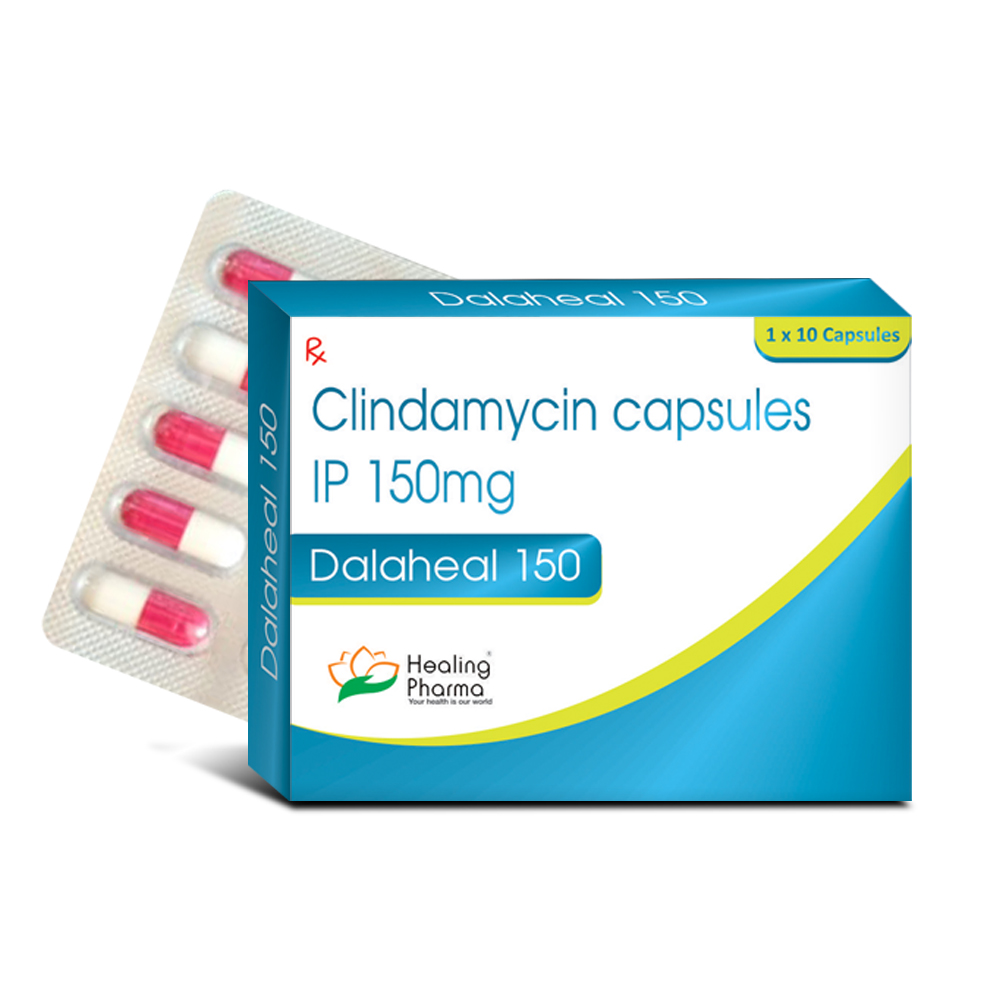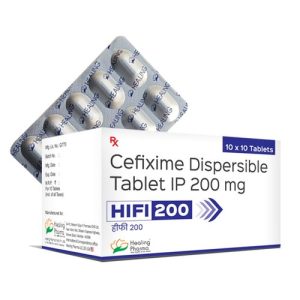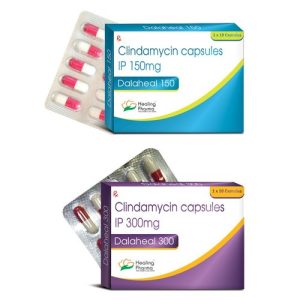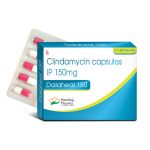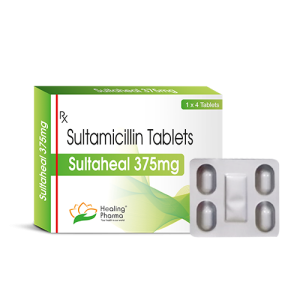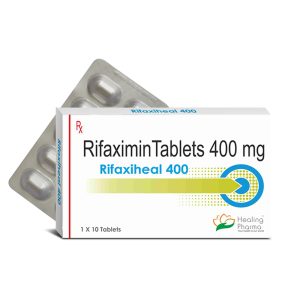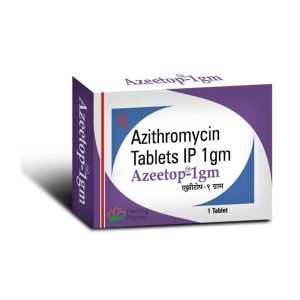| Strength | 150 Mg |
| Packaging Size | 10 Capsules |
| Brand | Dalaheal 300 |
| Composition | Clindamycin |
| Manufacturer | Healing Pharma |
| Treatment | Bacterial infections |
Clindamycin (Dalaheal 150) 150 mg capsule is a semi-synthetic lincosamide antibacterial drug used in the treatment of a variety of severe infections due to susceptible microorganisms.
Drug =Clindamycin
Number of Pills Per Order = 10
Strength = 150 mg.
Manufacturer = Healing Pharma
How To Take
Take Clindamycin precisely as directed by your doctor or according to the instructions on the label. Do not take more or less than instructed by your doctor.
This medicine may be taken with or without food. Try to take it at the same time each day.
Clindamycin is available as a capsule. Swallow it whole with a full glass of water.
Clindamycin must be taken at a regular interval for it to be effective. Continue taking this medicine even when you feel better.
Do not skip any doses. You must complete the entire course of the medicine. If you don’t, the infection will not be appropriately controlled.
Take Clindamycin precisely as directed by your doctor or according to the instructions on the label. Do not take more or less than instructed by your doctor.
Dosage of Clindamycin (Dalaheal 150) 150 mg
Adult:
Anaerobic infections; Disease due to Gram-positive bacteria Serious infections caused by susceptible staphylococci (both penicillinase- and non-penicillinase-producing), streptococci (except Streptococcus faecalis), pneumococci, and anaerobic pathogen: Moderately severe: 150-300 mg 6 hourly. Severe: 300-450 mg 6 hourly.
In cases of β-haemolytic streptococcal infection: Continue for at least 10 days to prevent subsequent rheumatic fever or glomerulonephritis.
Missed Dose
If you miss a dose, skip the missed dose and return to your usual dosing schedule. If you often forget to take your medicine, let your doctor and pharmacist know.
Do not double a dose under any circumstances.
Overdose of Clindamycin (Dalaheal 150) 150 mg
Signs of overdose may include the following:
- Dermatitis
- Nephrotoxicity
- Hepatotoxicity
- Hematological abnormalities
- Severe diarrhea and pseudomembranous colitis that may result in death
- Hypotension and cardiac arrest
Seek medical help immediately.
Contraindications
People with the following medical conditions should not take Clindamycin:
- Hypersensitivity
- History of inflammatory bowel disease
- Regional enteritis
- Ulcerative colitis or antibiotic-associated colitis
Side Effects
Clindamycin may have the following side effects:
- Superinfection
- Leucopenia
- Agranulocytosis
- Eosinophilia
- Neutropenia
- Thrombocytopenia
- Diarrhea
- Abdominal pain
- Nausea
- Vomiting
- Esophagitis
- Esophageal ulcer
- Jaundice
- Urticaria
- Cervicitis
- Vaginal candidiasis
- Vaginitis
- Abnormal liver function tests
- Dysgeusia
- Headache
- Dizziness
- Azotaemia
- Oliguria
- Proteinuria
- Vulvovaginal irritation
- Vaginal moniliasis
- Maculopapular rash
- Pruritus
- Erythema
- Seborrhoea
- Contact dermatitis
Potentially Fatal:
- Pseudomembranous colitis
- Clostridium difficile-associated diarrhoea (CDAD)
- Severe hypersensitivity reactions such as Stevens-Johnson syndrome
- Toxic epidermal necrolysis
- Drug reaction with eosinophilia and systemic symptoms (DRESS)
Warnings
Do not use Clindamycin in people with the following conditions:
- Allergic reaction to Clindamycin or any other similar antibiotics such as lincomycin.
Inform your doctor and pharmacist if you are taking any of these medicines:
- Erythromycin
- Chloramphenicol
- Linezolid
- Atracurium
- Pancuronium
- Tubocurarine
- Warfarin
- Acenocoumarol
- Fluindione
- Rifampicin
Inform your doctor and pharmacist if you are taking any other medicines, including herbal tonics such as traditional Chinese medicines, supplements and nonprescription medicines.
This list does not include all medicines that may interact with Clindamycin.
How Does Clindamycin (Dalaheal 150) 150 mg Work?
Clindamycin is a lincosamide antibiotic which inhibits bacterial protein synthesis by reversibly binding to the 50S ribosomal subunit, thereby preventing the peptide bond formation, ribosome assembly and translation process.
Uses
Clindamycin is used to treat the following conditions:
- Anaerobic infections; Disease due to Gram-positive bacteria
- Acne vulgaris
- Bacterial vaginosis
Special Precautions and Connected Warnings
Take special precautions if you have the following conditions:
- Patients with a history of gastrointestinal disease (e.g. colitis)
- Atopic individuals
- Severe hepatic impairment
- Debilitated patients
- Children
- Pregnancy and lactation
- Avoid alcohol
Storage Conditions
- Store between 20-25°C. Storage recommendations may vary among countries or individual products. Refer to specific product guidelines.
- Store in a cool, dry place away from the reach of children.
- Do not use Clindamycin that is expired or out of date.

